You need to put some thought into details to have a smooth and productive endeavor. And the same logic holds true for the business of marketing.
When preparing to roll out a new advertising campaign, it’s only natural to feel a little giddy. However, before you launch, you should ask yourself, “Have I put enough thought into my campaign to make it a success?” If you’re not sure, please read the following information and check out create.vista.com, where you will be able to find innovative and creative solutions for your marketing activities. Here, we’ll go through eight questions you need to have answered before launching a campaign.
To Whom Are You Directing This Message?
Your intended audience is a key consideration for a number of important reasons. Which kind of buyer best represents your target market? Which specific subsets of consumers do you want to attract with your marketing efforts?
Your team may have produced the most innovative, educational, and exciting advertising campaign ever conceived, but it won’t matter if it reaches only those who have no interest in your product or service.
Where Is Your Audience Residing?

This is an obvious continuation of the prior question. If you want to reach your intended audience, you must know where to look. To what extent do they rely on over-the-top (OTT) services like HBO or Netflix, or do they prefer conventional television? Are they present on social media? What kinds of programs do they use? Think about everything that might affect your campaign before you start it.
Where Can You Reach Your Audience Most Effectively, and When Is the Best Time to Do So?

Finding out when your customers are online and what platforms they like using may help you save money on advertising while maximizing your return on investment. Marketing on social media sites like Facebook and Instagram may be prioritized by a business that caters to consumers, whereas a company that targets other businesses could put greater emphasis on the professional networking site LinkedIn.
Time is of the essence; consider the difference between airing a commercial during midday and primetime on television. Targeting the 9–5 crowd is a no-brainer if your company’s primary customer base consists of the working class.
What Do You Want to Accomplish in This Marketing Journey?
Different campaigns aim for different outcomes. Some are made to get people talking about a company; others are crafted to get people interested in buying, and still others are designed to really sell.
It is important to know where you’re heading with your marketing. You can help your team stay on task and evaluate the success of your campaign by setting SMART objectives.
What Can We Learn from Our Past Success (and Failure)?
Those who fail to learn from the past are condemned to live through its repetition. However, repeating a failed strategy and expecting new outcomes is the definition of insanity. So, what does this all mean? And why are we mentioning these old-fashion pearls of wisdom?
Keep track of all your results. Don’t replicate an unsuccessful marketing strategy from the past. Examine the data you already have to determine which actions were successful and which were not. It’s the only way to prevent making the same errors again.
Is There an Optimal Length for a Campaign? And when shall we expect results?

Depending on your response to question 4, you may get different options here. Campaigns, according to some marketers, should last for around 45 days. On the other hand, if your primary goal is building brand recognition, you may want to let the campaign continue for a while. You should have a clear schedule before kicking up any new endeavor. The budget, goals, strategy, and other elements play a role in how long a campaign will go.
What Are Your Key Performance Indicators?
Again, this question has no universally correct answer since it is dependent on the nature of the campaign. It’s important to monitor KPIs that have the closest relationship to the campaign’s ultimate goal. If you want to know how effective your efforts are in increasing website visits, clicks, and bounce rates, you should monitor these metrics.
In What Ways Do You Plan to Foster Your Company’s Growth?
Like it or not, a campaign’s success hinges on the answer to this often-overlooked issue. Let’s say your advertising drives a huge increase in revenue. However, if you don’t have the proper resources to help your clients, you might end up with a severely damaged brand name. Your company’s reputation will benefit greatly from the implementation of a thorough strategy for maintaining forward momentum and success as you cultivate new partnerships.
Conclusion
Before beginning your next marketing effort, your organization should have solid answers to at least these eight questions. You’ll be able to maximize your return on investment and keep becoming better if you can accomplish this.



